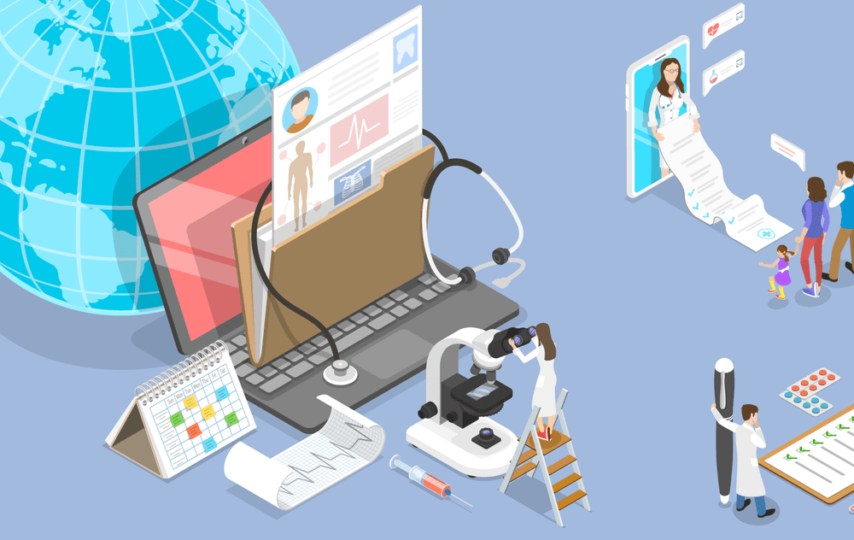The rise of electronic medical records in the digital age is not surprising. EHRs allow doctors to have the information they need in order to make better decisions. Doctors and patients are at risk if they don’t have the correct medical information, such as electronic health records.
An ONC Survey released this week will dispel any doubts that most patients prefer electronic health records to traditional paper methods. The study found that 76% of Americans want an EHR from their healthcare providers. This confirms the idea that EHRs are supported by a lot of people.
Electronic Health Records offer many benefits, including lower costs, greater efficiency, and more precise decisions. EHRs have been widely promoted by hospitals and medical practices over the past few years. We will be discussing the many benefits of EHRs and the importance of these vital records in improving the patient experience.
They save time
EHRs offer the greatest benefit to your time and productivity. EHRs make it possible to perform the majority of procedures that are dependent on one’s medical record more efficiently. EHRs can reduce the time spent waiting or filling out paperwork but the time saved is still greater than the time a patient would spend in a regular face-to-face appointment with their doctor. It can take a long time for doctors to discuss a patient’s medical history with other doctors. EHRs can make this a smoother and faster process, which saves time for the patient.
They increase doctor accuracy
Some professions are safe from serious consequences. Healthcare is one such exception. Doctors don’t always have the luxury to correct their mistakes and fix their errors. A simple mistake or miscalculation could prove fatal. It is often the decisions we make every day that can make the difference between life or death. To fully understand and address the patient’s situation, doctors rely on information from the patient’s medical record. It is vital that all information be accurate for the right decision to be taken.
Medical errors are the third leading cause of death in America after heart disease and cancer. According to a 2013 Journal of Patient Safety, there could be as many as 400,000 deaths each year in America due to medical mistakes. This is more than the combined deaths due to car accidents and AIDS. John T. James concludes his Journal of Patient Safety report with the following powerful conclusion:
It doesn’t matter if 100,000, 200,000 or 400,000 Americans die each year from PAEs (preventable adverse effects) in hospitals. All of these estimates require assertive action from providers, legislators, as well as people who may one day become patients. However, progress and action on patient safety have been slow. One can only hope that the current, evidence-based estimate of 400,000+ annual deaths will prompt a public outcry for needed changes and increased vigilance in the medical care to address harm to patients who visit a hospital to seek treatment.
James has requested EHRs as one of his assertive actions. According to the Soliant article, hospitals with EHR systems have a 3-4 percent lower mortality rate than hospitals without them. This may seem small, but it shows that EHRs can save thousands of lives each year in the United States.
They allow for more involvement
Patients want to participate in decisions and discussions that affect their personal health and care. Patients want to be informed at all times about what is happening and that their opinions are taken seriously. They want to be able to access their medical records, appointments summaries, lab results and even their doctor at any time. All of this is possible with EHRs and the Patient Portal functionality that comes with the software. EHRs allow patients to be more proactive in their health care, increasing their engagement and effectiveness.
They reduce the amount of work
It can be frustrating to deal with the formalities that surround your patient’s healthcare. It can be a hassle to deal with paperwork, wait time, and struggle to access and share patient’s health records. EHRs make it much easier to reduce these headaches. EHRs, according to HealthIT.gov, can dramatically reduce the “hassle factor” in healthcare. Patients are able spend less time worrying about technicalities and are more productive and proactive when it comes to their healthcare.
They lower total costs
The majority of arguments for electronic health records focusing on saving money revolve around practical issues. EHRs can reduce paper-based and office supply costs. This is only a fraction of the financial benefits they offer. Many factors play a major role in determining how much money can be saved. Implementing an EHR system doesn’t guarantee lower costs. Rob Lowes, Medscape journalist, explains in this article how while some physicians lose money using EHRs, others who achieve positive ROI have used their EHRs to increase revenue. EHRs aren’t allowing doctors to save money. This is because they don’t fully utilize their capabilities. An EHR system for small practices that is fully functional will result in lower costs and long-term savings across multiple areas.
They increase efficiency
Electronic health records offer two benefits that are more directly applicable: efficiency and accessibility. Accessing patient’s medical records used to be a time-consuming and tedious task. To get a hard copy of the report from one office to another, it would have to pass through several people and processes. This not only wastes time but also increases the chance of human error.
EHRs eliminate these risks. EHRs eliminate the need to file paperwork or transport people – all data is accessible remotely. Hospitals are now able to allocate resources and time more efficiently due to a significant reduction in the amount of physical storage and labor requirements. Accessibility between electronic health records and traditional medical records is nearly incomparable. In seconds, doctors can securely access the patient’s file.
EHRs allow for files to be organized and regulated in a much more efficient way than traditional alternatives. Patients visit many different doctors to get various reasons. Every occasion brings new information to the patient’s file that needs to be updated or added. In order to update a patient’s medical record, doctors often have to communicate with each other about a patient’s health history. It is difficult to get in touch with another doctor when you have so little time. Further confusion can be caused by the multiple people who are adding to a patient’s health record. This unorganized approach can lead to costly errors and is often very costly. EHRs on the other side, however, greatly improve the organization and coordination of a patient’s health record. HealthIT.gov states that EHR systems can reduce fragmentation and improve care coordination. EHRs can be used to organize and integrate patient information, and allow for instant distribution to all authorized care providers. EHR alerts, for example, can be used by providers to notify them when a patient is in hospital. This allows them to follow up on the patient’s progress.
They allow for better treatment
What are the individual benefits of electronic health records? Better healthcare in general. Patients will appreciate the reduced time, increased involvement and less hassle. But in the end, what really matters to them is the best care possible. Simply put, patients won’t get the best care if they don’t have EHRs and medical billing software. EHRs improve the quality of care that you can provide, which leads to happier and healthier patients.
Conclusion
Medical industry is constantly evolving. Electronic Health Records (EHR) allow doctors to make better decisions, work more efficiently, and increase patient satisfaction. EHR has led to improved medical outcomes, which have resulted in happier and healthier patients.








